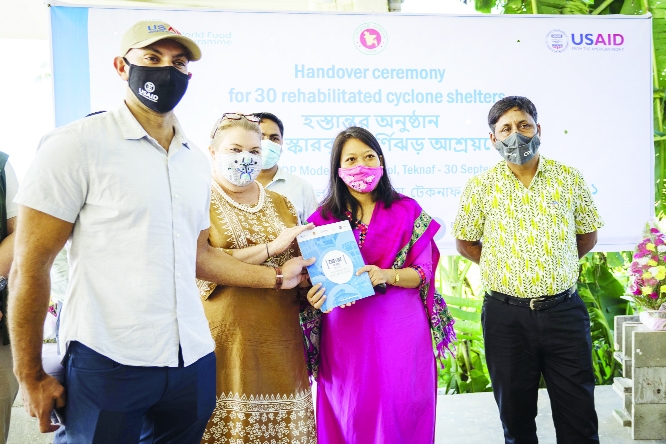
National Desk :
At a ceremony on Thursday, senior officials from the U.S. Agency for International
Development (USAID) and the United Nations World Food Programme (WFP) handed over thirty newly rehabilitated cyclone shelters in the Ukhiya and Teknaf sub-districts of Cox’s Bazar to the Government of Bangladesh. The handover ceremony took place in one of the rehabilitated shelters in Teknaf.
The shelters will protect approximately 20,000 people during an emergency, and were structurally rehabilitated as part of the second phase of WFP’s disaster preparedness program, funded by the USAID Bureau for Humanitarian Assistance (USAID/BHA), which aims to strengthen the capacity of local government actors and communities to prepare for and respond to natural disasters.
“Cox’s Bazar is one of the most vulnerable and disaster-prone regions of Bangladesh which is why we have prioritized strengthening the resilience of the local community to save lives during natural disasters,” said Sheila Grudem, Senior Emergency Coordinator for WFP in Cox’s Bazar. “We believe these rehabilitation works will have a durable positive impact on people’s lives in this area,” Grudem added.
Cox’s Bazar District is regularly exposed to natural hazards such as tropical cyclones and associated storm surges, flash floods, and landslides. WFP’s rehabilitation works, funded by USAID, included making the shelters more resilient to strong wind and floods, making them more accessible to persons with disabilities, adding water and sanitation facilities as well as solar panels for electricity. The project also employed around 4,000 host community members in Cox’s Bazar District throughout the eight months of rehabilitation work, as community volunteers received cash from WFP for their contribution to the project.
“I express my gratitude to WFP and USAID for their support to this important work in the host communities of Cox’s Bazar,” said Ms. Srabasti Roy, Senior Representative of the Deputy Commissioner of Cox’s Bazar. “The cyclone shelters will contribute much to protecting the community during heavy rains and floods.”
“On most days, these buildings serve as schools or municipal offices, but when the next disaster strikes, they will each keep 800 to 1,000 people safe from flooding, landslides, rain, and wind,” said Randy Ali, Deputy Mission Director, USAID. “We’re proud of the work we’ve accomplished to help Cox’s Bazar become more resilient to disasters, and of our collaborative partnership with WFP, the Government of Bangladesh, local organizations, and -most importantly- the communities we are supporting,” he added.

